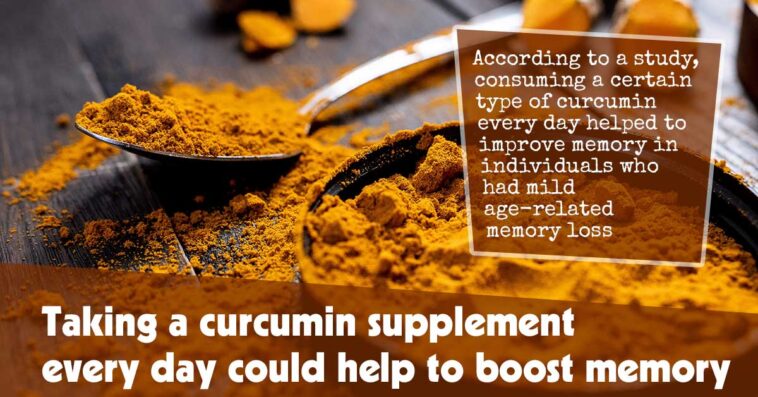Consuming a Curcumin Supplement Daily May Enhance Memory
A curcumin supplement that is easily absorbed improves memory
A study found that consuming certain types of curcumin daily helped improve the memory of individuals with mild age-related dementia.
Curcumin, a compound in turmeric, is derived from the roots of the Curcuma Longa plant. It gives Indian curry its golden orange color.
Researchers studied the effects of a curcumin-containing supplement on memory in individuals without dementia, and also the effect curcumin may have on microscopic plaques and tangles found in Alzheimer’s patients’ brains.
In laboratory studies, it was shown that curcumin had antioxidant and anti-inflammatory effects. In laboratory research, curcumin has been shown to have antioxidant and anti-inflammatory properties.
Curcumin’s effect on the brain remains unclear, but its ability to reduce brain inflammation, which is linked with major depression and Alzheimer’s disease, could explain it.
The study involved 40 people aged between 50-90 with mild memory problems. The 40 participants were randomly assigned to either 90mg of curcumin twice daily or a placebo for 18 months.
All 40 participants were given standard cognitive tests at the start of the research and at intervals of six months. Curcumin levels in the blood were also monitored at the outset of the study, as well as after 18 months. Thirty participants underwent PET scans to measure the levels of tau and amyloid in their brains. This was done at the start of the study, and then again 18 months later.
Curcumin users experienced significant improvements in their attention and memory, whereas those who took a placebo did not. Over the course of 18 months, those who took curcumin showed a 28% improvement in memory tests.
Curcumin users also reported mild improvements in mood, and brain PET scans showed significantly lower tau and amyloid levels in the amygdala and hypothalamus compared with those taking placebos.
The amygdala and hypothalamus are brain areas that control some memory and emotional functions.
However, curcumin and turmeric supplements are difficult to absorb. The absorption can be increased by combining other ingredients, such as the compound piperine found in black pepper which increases curcumin’s bioavailability by 2000%
Combination of curcumin and vitamin D could help to clear amyloid plaques in Alzheimer’s
Researchers found that curcumin and a certain type of vitamin D could stimulate the immune system, helping to clear the amyloid beta plaques from the brain.
Vitamin D3 is a nutrient that is essential for bone and immune health. It is produced by the sun through the skin. Vitamin D deficiency can occur during the winter months or for those who spend a lot of time indoors, such as people with Alzheimer’s.
Monocyte cells, isolated from blood samples of 9 Alzheimer’s sufferers, 1 person with mild cognitive impairment and 3 healthy controls, were transformed into macrophages, which function as the cleaning crew for the immune systems, moving throughout the body and the brain, and gobbling up waste products like amyloid beta. The macrophages are then incubated using synthetic or natural amyloid beta, vitamin D3, curcumin and other substances.
Researchers found that curcumin, which is naturally occurring, was not easily absorbed and it broke down quickly before it could be utilized. It also had a low potency, making it ineffective compared to synthetic curcuminoids.
The researchers found that curcuminoids enhanced the surface binding of the amyloid b beta to macrophages and that vitamin D strongly stimulated the uptake and the absorption of the amyloid b beta in macrophages in most people.
Curcumin and Vitamin D work differently on the immune system. Depending on the individual, either one or both could be more beneficial.
